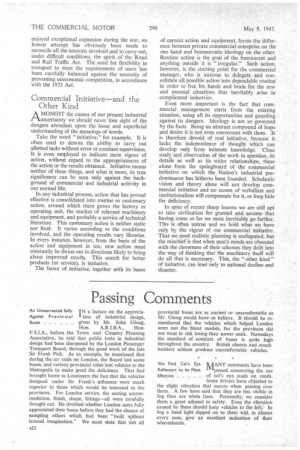Commercial Initiative—and the Other Kind
Page 24

If you've noticed an error in this article please click here to report it so we can fix it.
AMONGST the causes of our present industrial uncertainty we should never lose sight of the dangers attendant upon the loose and superficial understanding of the meanings of Words.
Take the word "initiative," for example. It is often used to denote the ability to carry out allotted tasks without error or constant supervision. It is even employed to indicate mere vigour of action, without regard to the appropriateness of the action or the results obtained. Initiative means neither of these things, and what is more, its true significance can be seen only against the background of commercial and industrial acitivity in our normal life.
In any industrial process, action that has proved effective is consolidated into routine or customary action, around which there grows the factory or operating unit, the market of relevant machinery and equipment, and probably a service of technical literature. This customary action is neither static nor final. It varies according to the conditions involved, and the operating results vary likewise. In every instance, however, from the basis of the action and equipment in use, new action must constantly be thrust out in directions likely to bring about improved results. This search for better products (or service), is initiative.
The factor of initiative, together with its bases of current action and equipment, forms the difference between private commercial enterprise on the one hand and bureaucratic ideology on the other. Routine action is the goal of the bureaucrat and anything outside it is "irregular." Such action, however, is the starting point for the commercial manager, who is anxious to delegate and consolidate all possible action into dependable routine in order to free his hands and brain for the new and unusual situations that inevitably arise in complicated industries.
Even more important is the fact that commercial management starts from the existing situation, using all its opportunities and guarding against its dangers. Ideology is not so governed by the facts. Being an abstract compound of hope and desire it is not even conversant with them. It is therefore devoid of real initiative, -because it lacks the independence, of thought which can develop only from intimate knowledge. Close study and observation of the work in question, its details as well as its wider relationships, these alone form the springboard of the commercial initiative on which the Nation's industrial predominance has hitherto been founded. Scholastic vision and theory alone will not develop commercial initiative and no screen of verbalism and institutionalism will compensate for it, or long hide the deficiency.
In spite of recent sharp lessons we are still apt to take civilization for granted and assume that having come so far we must inevitably go farther. This is often untrue and we hold what we have only by the vigour of our commercial initiative. That we need realistic planning is undisputed, but the mischief is that when men's minds are obsessed with the cleverness of their schemes they drift into the way of thinking that the machinery itself will do all that is necessary. This, the "other kind" of initiative, can lead only to national decline and disaster.












































































